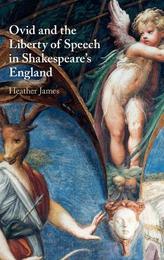
|
Ovid and the Liberty of Speech in Shakespeare's England
Hardback
Main Details
| Title |
Ovid and the Liberty of Speech in Shakespeare's England
|
| Authors and Contributors |
By (author) Heather James
|
| Physical Properties |
| Format:Hardback | | Pages:320 | | Dimensions(mm): Height 235,Width 160 |
|
| Category/Genre | Literary studies - general
Literary studies - classical, early and medieval
Literary studies - c 1500 to c 1800 |
|---|
| ISBN/Barcode |
9781108487627
|
| Classifications | Dewey:821.309 |
|---|
| Audience | | Professional & Vocational | |
|---|
| Illustrations |
Worked examples or Exercises; Worked examples or Exercises
|
|
Publishing Details |
| Publisher |
Cambridge University Press
|
| Imprint |
Cambridge University Press
|
| Publication Date |
8 July 2021 |
| Publication Country |
United Kingdom
|
Description
The range of poetic invention that occurred in Renaissance English literature was vast, from the lyric eroticism of the late sixteenth century to the rise of libertinism in the late seventeenth century. Heather James argues that Ovid, as the poet-philosopher of literary innovation and free speech, was the galvanizing force behind this extraordinary level of poetic creativity. Moving beyond mere topicality, she identifies the ingenuity, novelty and audacity of the period's poetry as the political inverse of censorship culture. Considering Spenser, Marlowe, Shakespeare, Jonson, Milton and Wharton among many others, the book explains how free speech was extended into the growing domain of English letters, and thereby presents a new model of the relationship between early modern poetry and political philosophy.
Author Biography
Heather James is Associate Professor of English and Comparative Literature at the University of Southern California, and President of the Shakespeare Association of America, 2016-2017.
Reviews'This is a truly excellent study. I am not sure there is anyone else who has Heather James's particular combination of critical gifts: here we see reading and writing with great purpose and freshness, clear and flexible thinking shedding new light on well-known texts and connections, and a strong and original argument that proceeds so smoothly and generously that it changes your mind decisively almost without you realising it.' Raphael Lyne, University of Cambridge 'An erudite, pathbreaking achievement ... Highly recommended.' N. Lukacher, Choice Connect
|